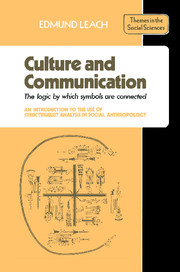 Culture and Communication
Culture and Communication Book contents
- Frontmatter
- Contents
- Culture and communication: the logic by which symbols are connected
- Introduction
- 1 Empiricists and rationalists: economic transactions and acts of communication
- 2 Problems of terminology
- 3 Objects, sense-images, concepts
- 4 Signals and indices
- 5 Transformations
- 6 Theories of magic and sorcery
- 7 The symbolic ordering of a man-made world: boundaries of social space and time
- 8 The material representation of abstract ideas: ritual condensation
- 9 Orchestral performance as a metaphor for ritual sequence
- 10 The physiological basis of sign/symbol sets
- 11 Mapping: time and space as reciprocal representations
- 12 Rank order and orientation
- 13 Examples of binary coding
- 14 Mating prescriptions and proscriptions
- 15 Logic and mytho-logic
- 16 Basic cosmology
- 17 Rites of transition (rites de passage)
- 18 The logic of sacrifice
- 19 Conclusion
- Bibliography
- Index
12 - Rank order and orientation
Published online by Cambridge University Press: 05 June 2012
- Frontmatter
- Contents
- Culture and communication: the logic by which symbols are connected
- Introduction
- 1 Empiricists and rationalists: economic transactions and acts of communication
- 2 Problems of terminology
- 3 Objects, sense-images, concepts
- 4 Signals and indices
- 5 Transformations
- 6 Theories of magic and sorcery
- 7 The symbolic ordering of a man-made world: boundaries of social space and time
- 8 The material representation of abstract ideas: ritual condensation
- 9 Orchestral performance as a metaphor for ritual sequence
- 10 The physiological basis of sign/symbol sets
- 11 Mapping: time and space as reciprocal representations
- 12 Rank order and orientation
- 13 Examples of binary coding
- 14 Mating prescriptions and proscriptions
- 15 Logic and mytho-logic
- 16 Basic cosmology
- 17 Rites of transition (rites de passage)
- 18 The logic of sacrifice
- 19 Conclusion
- Bibliography
- Index
Summary
Any classification in which the classes are spelled out in sequence 1, 2, 3 … implies a potential ranking of the categories. First Class is not just different from Second Class, it is better.
We make qualitative distinctions of this kind on all sorts of grounds. X may differ from Y because it is ‘better’, ‘bigger’, ‘faster’, ‘more expensive’, ‘more powerful’, ‘older’, etc., etc. In such qualitative statements it may be difficult to decide where description ends and symbolic statement begins. If an anthropologist in New Guinea is told ‘so-and-so is a big man’ should he infer that ‘so-and-so’ is physically large and powerful or that he is a political leader, or both?
Qualitative metaphors are not human universals but, as between one cultural context and another, they are often very similar. The politically influential are ‘superior’, and therefore sit ‘higher up’. But sitting ‘higher up’ may mean that the chair is on a raised dais, or it may mean that the chair is at one end of the table rather than another.
Etiquette may require that persons of ‘lower’ status prostrate themselves on the ground or bow the head in the presence of their ‘superiors’, but equally it may require that the inferiors stand up while the superiors sit down. Such permutations are all using the same set of up/down discriminations to serve as metaphors, but the patterning of the total system is not predictable in advance. Likewise the order in which individuals move in ceremonial procession almost always carries implication about their relative status, but in some processions the persons of highest status are at the front and in others they are at the back.
- Type
- Chapter
- Information
- Culture and CommunicationThe Logic by which Symbols Are Connected. An Introduction to the Use of Structuralist Analysis in Social Anthropology, pp. 53 - 54Publisher: Cambridge University PressPrint publication year: 1976
